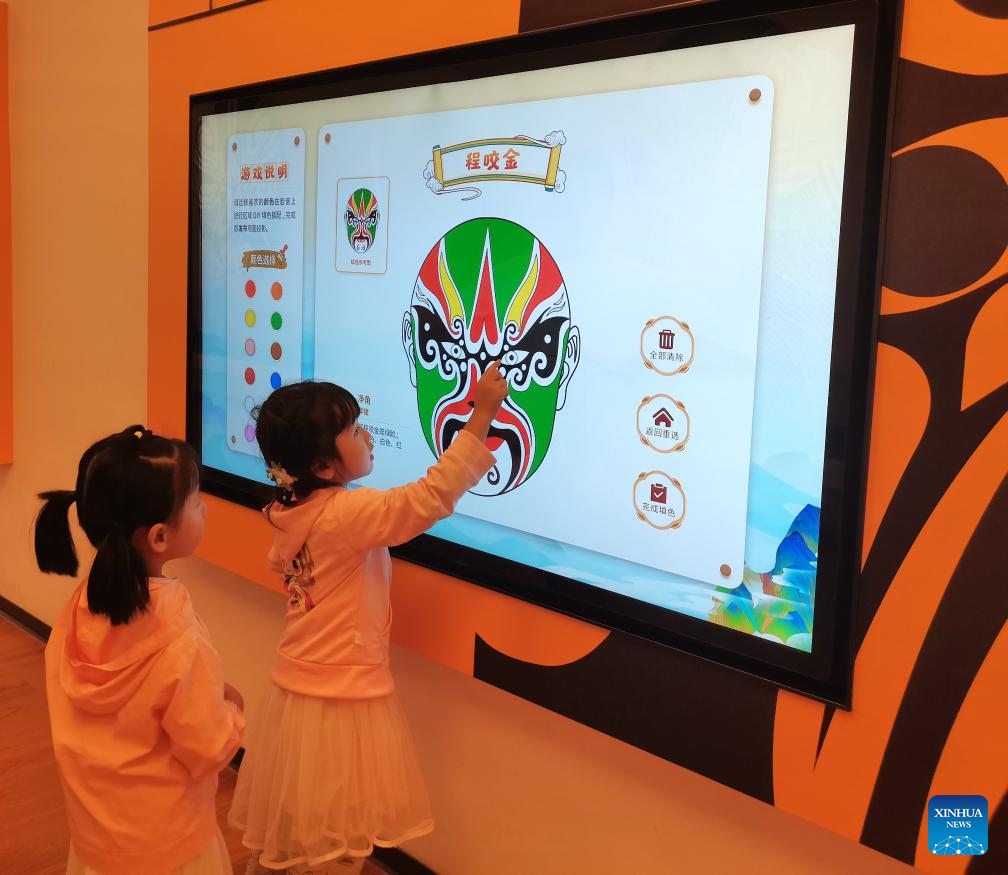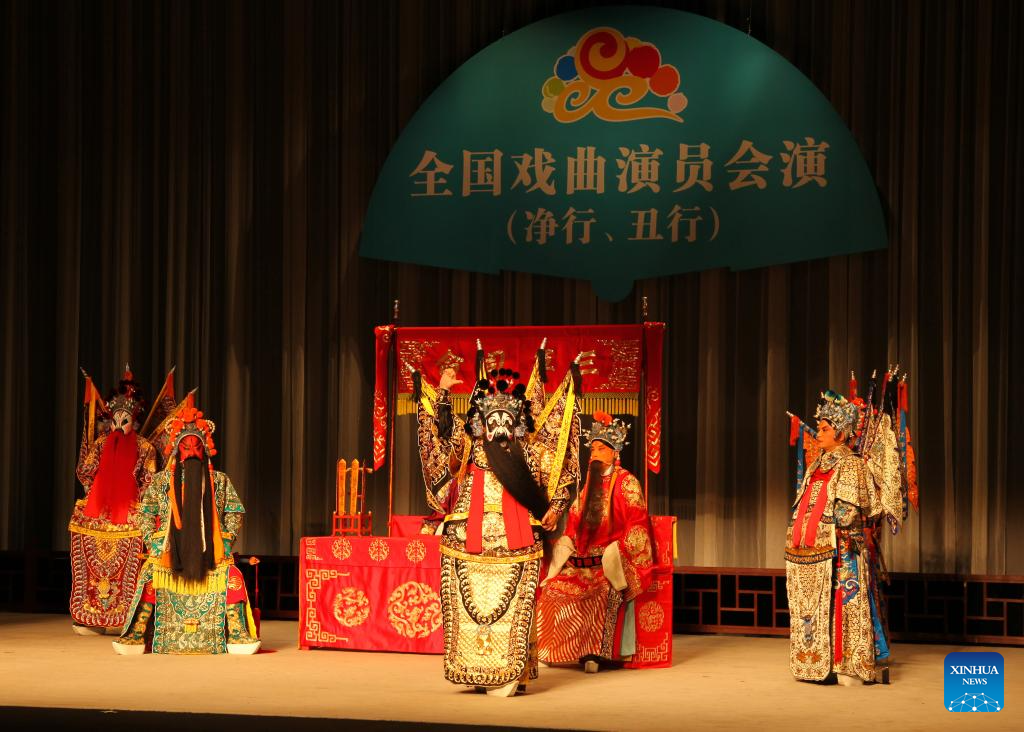600-year-old Kunqu Opera revives in modern life
From:XinhuaAuthor: 2024-09-29 16:10

A child clicks on an electronic screen to color an opera mask at the interactive experience space of a museum dedicated to local operas in Kunshan City, east China's Jiangsu Province, Sept. 8, 2024. (Xinhua/Jiang Wenqian)
In Kunshan City, east China's Jiangsu Province, the melodies of Kunqu Opera, one of China's most ancient and treasured art forms, are not confined to the stages of grand theaters, but ring out in unexpected scenes - school bells, fitness routines and even bus stop illustrations where lively cartoon figures greet passersby every day.
Kunshan is the birthplace of Kunqu, which blends poetry, music, intricate costumes and graceful performances. The 600-year-old Chinese tradition earned its place on UNESCO's list of World Intangible Cultural Heritage in 2001.
But Kunqu is far from a relic. In the bustling streets of Kunshan, this ancient art form continues to find new life, delicately balancing between preserving its timeless beauty and embracing the demands of modernity.
For performers like You Tengteng, an actress at the Kunshan Contemporary Kunqu Theater, the act is both a challenge and a passion. After a long day of rehearsal, You and her colleagues discussed their latest performance strategies, not in a traditional theater but on Douyin, a Chinese video-sharing platform.
In partnership with the platform, You and seven other performers livestream their Kunqu shows for at least 20 hours each month. The goal is simple yet ambitious: to reach a new generation of audiences who might hesitate to sit through two or three hours-long performance in an opera house.
One of the challenges for them is interpretation - not from language to language, but from centuries-old art to the flickering screens of smartphones.
To draw audiences in the digital age, the performers have condensed the intricate art form into digestible one-hour segments, inviting viewers to experience Kunqu in more relaxed settings, whether over tea at a caf or within the walls of a museum.
The strategy seems to be working, particularly among Chinese youth. After performances, it is not uncommon to see young fans eagerly lining up for selfies and autographs with the performers, their newfound enthusiasm for this ancient art is a testament to its evolving relevance.
You was not so surprised to see the heartening trend. "The aesthetics of Chinese culture, ancient and modern, are continuous," she said. "What we strive to inherit is not just the technique, but the pursuit of beauty that has always existed."
"And Kunqu is a reflection of societal values, many of which were born in the feudal era. This tension between the past and present is where we find space for innovation, reimagining the stories of old to resonate with modern audiences," she added.
One such innovation was seen in the Kunshan Contemporary Kunqu Theater's production of The Story of Washing Gauze, a play originally written in the 16th century. The story centers on Xi Shi, a legendary beauty from ancient China, who sacrifices her personal happiness to serve her country.
In the original ending, after years of separation and war, Xi Shi reunites with her lover and they live happily ever after. However, the modern production altered the ending, leaving it open and tinged with sorrow. The reimagining struck a chord with audiences, many of whom praised the new ending for its emotional depth and realism, noting that it made Xi Shi's character more relatable to modern viewers.
Kunshan's commitment to preserving and promoting Kunqu goes beyond the stage. Over the last few years, the Kunshan Kunqu theater has held more than 2,500 performances and tours, drawing over 20 million visitors from China and abroad.
In addition, the local government has invested 177 million yuan (about 25.2 million U.S. dollars) to fund new productions, support rehearsal spaces, and subsidize performances since 2018.
Kunshan's commitment extends to preserving not only Kunqu but the diverse operatic traditions of China. Since 2018, the annual Chinese Opera Gala (Kunshan) has been hosted by the Ministry of Culture and Tourism and provincial government. The gala showcases 348 traditional operas, including puppetry and shadow plays, bringing these art forms - many of which are endangered - into the spotlight and providing a platform for artistic exchange.
Wang Wei, an actor of Liuzi Opera from Shandong Province, performed the role of General Zhang Fei to the gala, who is a famous character from the classic Chinese novel "The Romance of the Three Kingdoms."
To play the role more impressively, Wang often learns from other versions of this character to enrich his performance and finally he creates a brave and lovable General Zhang Fei. "This gala is such a good opportunity to learn from each other, I am very glad to stand on this stage to let more people know our Liuzi Opera," Wang said.
In addition to performances, the gala includes training workshops for performers of minor or endangered operatic forms. Xu Min, a composer and performer of tea-picking opera from Jiangxi Province, has attended these workshops for years.
"If you focus only on your own art, you become isolated," she said. "But here, I'm exposed to so many different plays, rhythms, and techniques. I feel like a sponge, absorbing everything."
Kunshan's role as the birthplace of Kunqu Opera has positioned the city as a guardian of traditional Chinese opera, said Zhou Wei, Party chief of Kunshan. Through the construction of a museum dedicated to local operas and the host of annual national event, Kunshan endeavors to offer a space for art exchange and growth.
"We want to create a broad stage for different operas to flourish and to integrate traditional culture with the modern world," Zhou said.

You Tengteng, an actress at the Kunshan Contemporary Kunqu Theater, performs during "The Story of Washing Gauze" in Kunshan City, east China's Jiangsu Province, Sept. 17, 2021. (Kunshan Contemporary Kunqu Theater/Handout via Xinhua)

Wang Wei (C), an actor of Liuzi Opera from Shandong Province, performs the role of General Zhang Fei, who is a famous character from the classic Chinese novel "The Romance of the Three Kingdoms," during the annual Chinese Opera Gala (Kunshan) at a Kunqu theater in Kunshan City, east China's Jiangsu Province, Sept. 9, 2024. (Liuzi Opera from Shandong Province/Handout via Xinhua)
Edit:董麗娜
The copyright of the article and the picture belongs to the original author. If there is any infringement, please contact to delete it